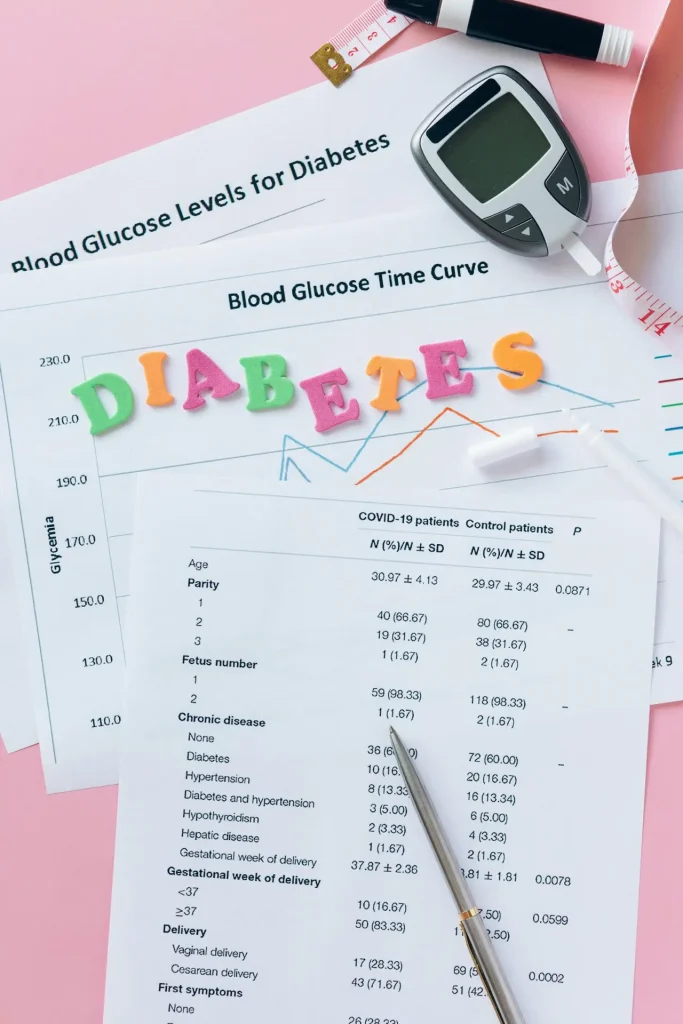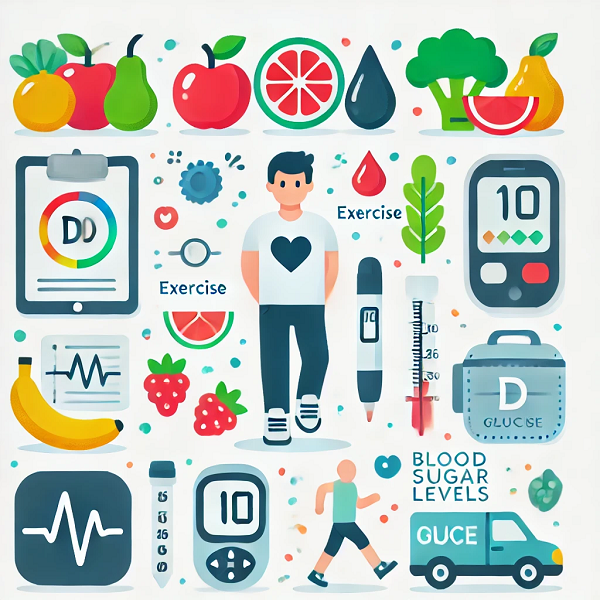Introduction
When you hear the word “diabetes,” it might sound daunting, but it doesn’t have to be a life sentence. Understanding this condition is the first step in managing it effectively. Diabetes is a chronic disease that affects how your body turns food into energy. Knowing how to live with it can transform your outlook and quality of life.
Understanding Diabetes
What is Diabetes?
Diabetes is a condition that occurs when your blood glucose, also known as blood sugar, is too high. Blood glucose is your main source of energy and comes from the food you eat. Insulin, a hormone made by the pancreas, helps glucose from food get into your cells to be used for energy. Sometimes your body doesn’t make enough—or any—insulin or doesn’t use insulin well. Glucose then stays in your blood and doesn’t reach your cells.
Types of Diabetes
Type 1 Diabetes
Type 1 diabetes is an autoimmune condition where the body attacks insulin-producing cells in the pancreas. It’s usually diagnosed in children and young adults and requires lifelong insulin therapy.
Type 2 Diabetes
Type 2 diabetes is more common and occurs when the body becomes resistant to insulin or doesn’t make enough insulin. It’s often associated with older age, obesity, and physical inactivity.
Gestational Diabetes
Gestational diabetes develops during pregnancy and usually goes away after the baby is born. However, it increases the mother’s risk of developing type 2 diabetes later in life.
Symptoms and Diagnosis
Common Symptoms of Diabetes
- Increased thirst and hunger
- Frequent urination
- Unexplained weight loss
- Fatigue
- Blurred vision
- Slow-healing sores or frequent infections
How is Diabetes Diagnosed?
Diabetes can be diagnosed through blood tests such as:
- A1C test: Measures average blood glucose levels over the past 3 months.
- Fasting plasma glucose test: Measures blood sugar after an overnight fast.
- Oral glucose tolerance test: Measures blood sugar after fasting and then drinking a sugary drink.
Importance of Early Detection
Early detection and treatment of diabetes can decrease the risk of developing complications such as heart disease, nerve damage, and kidney problems.
Living with Diabetes
Daily Management of Diabetes
Living with diabetes involves regular monitoring and making lifestyle adjustments. This might sound overwhelming, but with a structured approach, it becomes manageable.
The Role of Diet and Nutrition
Eating a balanced diet is crucial. Focus on whole foods, lean proteins, healthy fats, and complex carbohydrates. Avoiding sugary drinks and processed foods can help maintain stable blood sugar levels.
Exercise and Physical Activity
Regular physical activity helps control blood sugar levels. Aim for at least 30 minutes of moderate exercise most days of the week. Activities like walking, cycling, and swimming are great options.
Monitoring Blood Sugar Levels
Regularly checking your blood sugar levels helps you understand how different foods, activities, and medications affect your diabetes. Use a glucometer or continuous glucose monitor (CGM) to keep track.
Medical Treatments for Diabetes
Insulin Therapy
For those with type 1 diabetes and some with type 2, insulin therapy is essential. There are different types of insulin, including rapid-acting, long-acting, and intermediate options.
Oral Medications
Various oral medications help control blood sugar levels in people with type 2 diabetes. These include metformin, sulfonylureas, and DPP-4 inhibitors, among others.
Emerging Treatments and Research
New treatments and research are continually emerging, offering hope for better management and even a cure. Innovations include artificial pancreas systems and advanced insulin delivery methods.
Mental and Emotional Well-being
Coping with the Diagnosis
Being diagnosed with diabetes can be emotionally challenging. It’s normal to feel overwhelmed, but remember, you’re not alone. Many people successfully manage their diabetes and lead fulfilling lives.
Psychological Support and Resources
Seeking psychological support can be beneficial. Therapists, support groups, and educational programs can provide the help you need to cope with the emotional aspects of diabetes.
Importance of Mental Health in Diabetes Management
Good mental health is crucial for effective diabetes management. Stress and depression can affect blood sugar levels, so finding ways to manage stress is important.
Lifestyle Changes and Prevention
Healthy Eating Habits
Adopting healthy eating habits can prevent or delay type 2 diabetes. Emphasize a diet rich in vegetables, fruits, whole grains, and lean proteins.
Regular Physical Activity
Engaging in regular physical activity helps maintain a healthy weight and improves insulin sensitivity, reducing the risk of type 2 diabetes.
Avoiding Risk Factors
Avoiding smoking, excessive alcohol consumption, and maintaining a healthy weight are critical in preventing diabetes.
Technological Advances in Diabetes Management
Glucose Monitoring Devices
Continuous glucose monitors (CGMs) provide real-time blood sugar readings, making it easier to manage diabetes.
Insulin Pumps and Smart Pens
Insulin pumps and smart pens offer precise insulin delivery, improving blood sugar control and flexibility.
Mobile Apps and Digital Health Tools
Various apps help track blood sugar levels, diet, and exercise, providing valuable data to manage diabetes effectively.
Community and Support Systems
Finding Support Groups
Connecting with others who have diabetes can provide emotional support and practical tips.
Family and Friends’ Role
Family and friends play a vital role in supporting someone with diabetes. Their understanding and encouragement can make a significant difference.
Online Communities and Resources
Online communities offer a platform to share experiences and advice. Websites, forums, and social media groups can be valuable resources.
Success Stories and Inspiration
Real-life Stories of People Thriving with Diabetes
Many people live active, successful lives despite having diabetes. Their stories can inspire and motivate you to manage your condition effectively.
Lessons Learned from Their Experiences
Learning from others who have navigated the challenges of diabetes can provide insights and strategies for your journey.
Diabetes Myths and Facts
Common Misconceptions About Diabetes
There are many myths about diabetes, such as the idea that eating too much sugar causes it. Understanding the facts can help dispel these misconceptions.
Dispelling Myths with Facts
Educating yourself about diabetes helps in making informed decisions and managing the condition effectively.
Importance of Regular Check-ups
Routine Medical Visits
Regular check-ups with your healthcare provider are essential to monitor your condition and adjust treatments as necessary.
Preventive Care and Screenings
Preventive care and screenings can help detect complications early and maintain overall health.
Impact on Different Age Groups
Diabetes in Children
Managing diabetes in children requires a team approach involving healthcare providers, parents, and teachers.
Diabetes in Adults
Adults with diabetes need to balance work, family, and health, making lifestyle adjustments as needed.
Diabetes in Seniors
Seniors may face unique challenges in managing diabetes, including other health conditions and mobility issues.
Global Perspective on Diabetes
Diabetes Prevalence Worldwide
Diabetes affects millions worldwide, with rising prevalence in many countries due to lifestyle changes and aging populations.
Efforts to Combat Diabetes Globally
Global initiatives aim to improve diabetes awareness, prevention, and treatment, helping to reduce the disease’s impact.
Conclusion
Diabetes is a manageable condition that doesn’t have to define your life. With the right knowledge, tools, and support, you can lead a fulfilling and active life. Embrace the journey, seek help when needed, and remember, you are not alone in this.
FAQs
What are the early signs of diabetes?
Early signs include increased thirst, frequent urination, extreme fatigue, and unexplained weight loss.
Can diabetes be cured?
Currently, there is no cure for diabetes, but it can be managed effectively with lifestyle changes and medical treatment.
How can I manage my diabetes effectively?
Effective management includes regular blood sugar monitoring, a balanced diet, regular exercise, and adhering to your prescribed treatment plan.
What are the risks of untreated diabetes?
Untreated diabetes can lead to serious complications, including heart disease, nerve damage, kidney failure, and vision problems.
How can family and friends support someone with diabetes?
They can offer emotional support, help with meal planning, encourage physical activity, and educate themselves about the condition.






